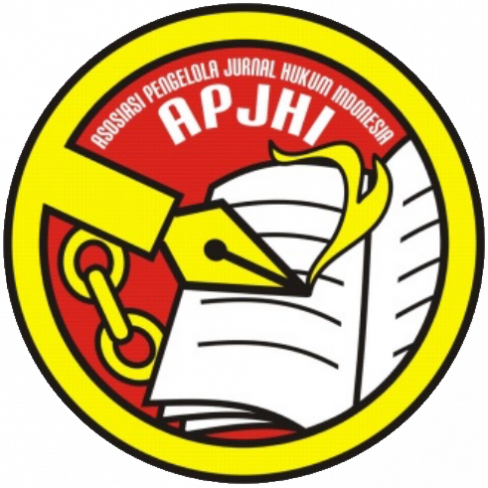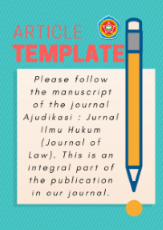Transformasi Layanan Administrasi Kependudukan Indonesia dalam Mewujudkan Konsep Welfare State
(Studi pada Dinas Kependudukan dan Pencatatan Sipil Kota Tangerang Selatan)
DOI:
https://doi.org/10.30656/ajudikasi.v6i2.5671Keywords:
Transformation, Service, Administration, Population, WelfarestateAbstract
The transformation of public services in the field of population administration began to be felt after the all-internet or online era began to bloom in Indonesia. This causes public service providers to be asked to make changes in the concept of serving the community by following the changing times. The research method used is qualitative research or sociological juridical. The primary data source is interviews with the South Tangerang City Population and Civil Registry Service, while the secondary data source is various legal book materials and statutory regulations. The results of the research can be found that the transformation of Indonesian population administration services has begun to lead to realizing the concept of "welfarestate" for the community, with the change in population administration services that previously used offline or the community was required to be physically present to take care of population administration, now with the all-internet era the organizers population administration implements services with an online system in order to reach the public so that services are more effective, efficient and excellent. The originality of this research is that people in today's era who are completely connected to the internet have resulted in the implementation of public services also having to follow it. The positive side of public services by being connected to the internet can make it easier for people to access population administration matters without coming physically in person. However, public services cannot fully use online services, population administration public services also require offline services in order to fulfill services for people who do not understand technology.
Downloads
References
As’adi, Edi. “Problema Penegakan Hukum Pelayanan Publik Oleh Lembaga Ombudsman Republik Indonesia Berbasis Partisipasi Masyarakat.†Refleksi Hukum: Jurnal Ilmu Hukum 10, no. 1 (2016).
Ashofa, Burhan. Metode Penelitian Hukum. Jakarta: Rineka Cipta, 2013.
Azhari, Aidul F. “Negara Hukum Indonesia: Dekolonisasi Dan Rekonstruksi Tradisi.†Jurnal Hukum IUS QUIA IUSTUM 19, no. 4 (2012): 491.
Hanafi, Imam, Didik Fakthur Rohman, Implementasi Kebiajakan Pelayanan Administrasi Kependudukan Terpadu (Studi pada Dinas Kependudukan dan Catatan Sipil Kota Malang), Jurnal Administrasi Publik (JAP), Vol. 1, No. 5
Nuriyanto, Penyelenggaraan Pelayanan Publik Di Indonesia, Sudahkah Berlandaskan Konsep Welfare State ?, Jurnal Konstitusi, Volume 11, Nomor 3, September 2014
Harahap, Zairin. Hukum Acara Peradilan Tata Usaha Negara. Jakarta: Raja Grafindo Persada, 2013.
Lexy, Moleong. Metode Penelitian Kualitatif. Bandung: Remaja Rosdakarya, 2014.
Oman Sukmana. “Konsep Dan Disain Negara Kesejahteraan.†Jurnal Sospol 2, no. 1 (2016).
Ridwan, H. R. Hukum Administrasi Negara. Jakarta: Raja Grafindo Persada, 2006.
Soehino. Ilmu Negara. Yogyakarta: Liberty, 1998.
Soemardi. Teori Hukum Dan Negara: Dasar-Dasar Ilmu Hukum Normatif Sebagai Ilmu Hukum Deskriptif Empirik. Bandung: Bee Media Indonesia, 2010.
Solechan. “Asas-Asas Umum Pemerintahan Yang Baik Dalam Pelayanan Publik.†Administrative Law & Governance Journal 2, no. 3 (2019).
Sukarno, Bilal, Natasha Feralika dkk, “Kegagapan Implementasi E-Government Dinas Kependudukan dan Pencatatan Sipil Kabupaten Bekasi di Era Pandemiâ€, Jurnal Identitas Administrasi Publik Vol 1 No 2, (2021).
Susanto, Sri Nur Hari, Merekontruksi Sistem Hukum Administrasi Menuju Hukum Yang Melayani, Masalah-Masalah Hukum, Vol 44 No 2, (2015).
Tui, Fenti Prihatini, Risman Ilato dkk, Inovasi Pelayanan Publik Melalui E-Government Di Dinas Kependudukan Dan Catatan Sipil Kota Gorontalo, Publik: Jurnal Manajemen Sumber Daya Manusia, Administrasi dan Pelayanan Publik, Vol IX No.2, (2022).
Downloads
Published
Issue
Section
License
Authors who publish with this journal agree to the following terms:
Authors retain copyright and grant the journal right of first publication with the work simultaneously licensed under a Creative Commons Attribution License that allows others to share the work with an acknowledgment of the work's authorship and initial publication in this journal.
Authors can enter into separate, additional contractual arrangements for the non-exclusive distribution of the journal's published version of the work (e.g., post it to an institutional repository or publish it in a book) with an acknowledgment of its initial publication in this journal.
Authors are permitted and encouraged to post their work online (e.g., in institutional repositories or on their website) before and during the submission process, as it can lead to productive exchanges and earlier and greater citation of published work.
All articles in Ajudikasi : Jurnal Ilmu Hukum can be disseminated provided they include the identity of the article and the source of the article (Ajudikasi : Jurnal Ilmu Hukum). The publisher is not responsible for the contents of the article. The content of the article is the sole responsibility of the author
Ajudikasi : Jurnal Ilmu Hukum is lincensed under a Creative Commons Attribution-ShareAlike 4.0 International License.










1.png)
.png)
.png)





.png)
.png)
.png)
.png)





.png)







